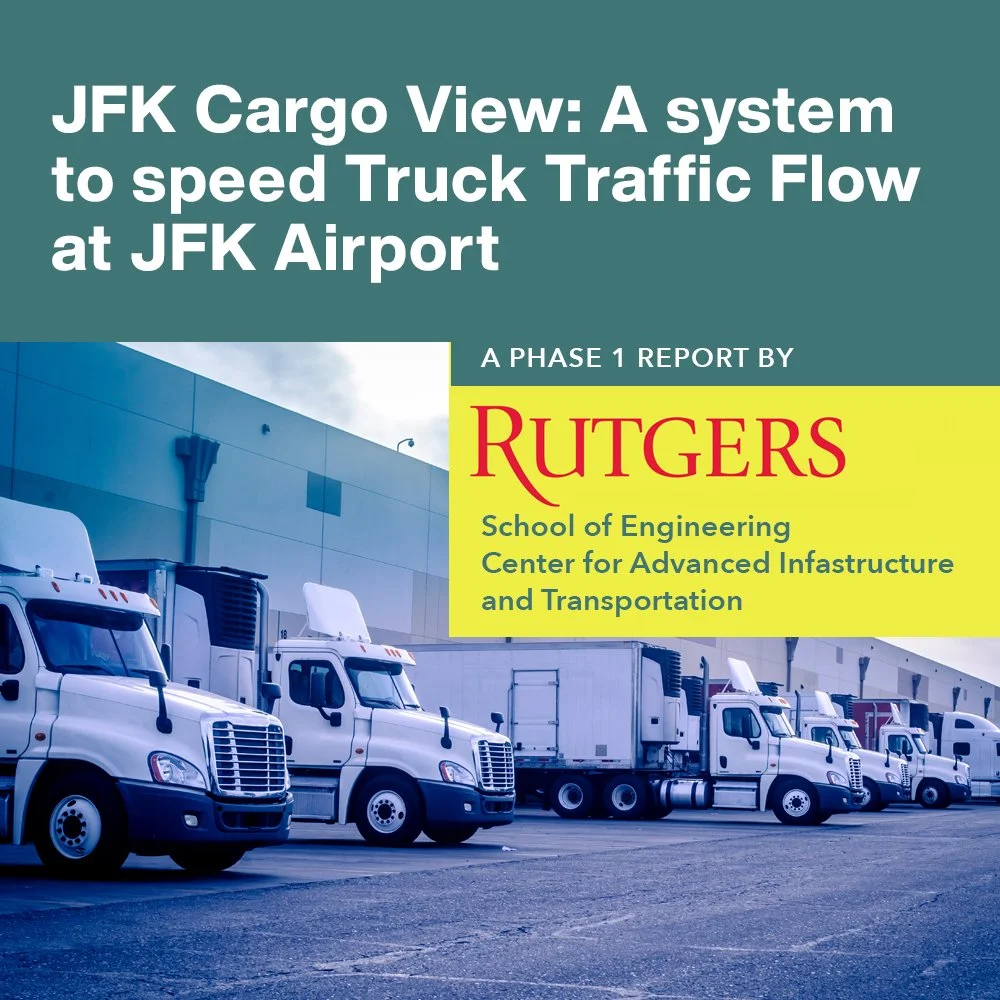New Study Reveals a Truck Flow Management System Would Improve Logistics at JFK International Airport
A new feasibility study of the air cargo supply chain process at JFK Airport makes a case for how a new, connected airport-wide Truck Flow Management System (TFMS) would streamline cargo operations for the on- and -off-airport logistics community, save time, money and fuel, and improve quality of life for residents, business owners and workers in the surrounding community. The feasibility study, JFK Cargo View: A System to Speed Truck Traffic Flow at JFK International Airport, was conducted by Rutgers University’s Center for Advanced Infrastructure and Transportation (CAIT) and commissioned by GatewayJFK, a Business Improvement District representing the off-airport cargo community, a vital link in the world’s supply chain.
The JFK Cargo View report identifies new technology that would include electronic data interfaces, cargo notifications via a mobile app, paperless truck check-in and dock scheduling to improve operational efficiency and effectiveness, and reduce idling time and diesel fuel usage. The goal of the TFMS is to improve efficiency and recoup the JFK cargo traffic lost since 9/11.
According to the Port Authority’s monthly (January 2022) Air Traffic Report, JFK Airport’s cargo tonnage was 103,096 short tons, or a projected 1.25 million short tons at year’s end, ranking it #8 among US airports based on air cargo tonnage, This is in contrast to 2000, when JFK Airport cargo tonnage ranked #3 among landed weight at US airports with 1.8 million tons.
According to the Study:
A TFMS system would reduce truck dwell time by an average of 38%.
Truckers would be informed about when cargo, docks, forklifts and personnel are ready, optimizing both import and export sides of the cargo process.
A TFMS would reduce truck congestion and lower the environmental impact of idling trucks. For example, CO2 emissions would be reduced each year by 80 to 512 metric tons based on the time savings scenarios outlined in the study.
A TFMS would save an estimated $2.5-$16.0 million in direct trucking costs annually as a result of reduced man hours and fuel and operational efficiencies.
The existing cargo management technology on-airport at JFK is not reflective of the available technology in today’s marketplace. Contributing to delays in the transfer process and causing economic losses for stakeholders within and beyond the logistics system include: poor GPS to get to facilities, inefficient dock scheduling, limited truck staging areas, on-site congestion due to multiple truckers arriving at the same time, exacerbated by the reduced pickup window from 48 hours to 24 hours. Federal Motor Carrier Safety Administration and Transportation Security Administration regulations and mandatory inspections have also added to cargo processing times on the ground.
“There is a clear need for an airport-wide information system for freight forwarders (on- and off-tarmac), ground handlers and truckers to track and accurately schedule cargo pickups,” said Frank Liggio, Chair of GatewayJFK’s Board of Directors. “The Port Authority’s development plans for JFK airport cargo facilities are a significant first step; however, the pilot program currently being tested at a single facility by a single cargo handler must inform, and be part of, an integrated, airport-wide communications system for cargo,” Liggio noted.
GatewayJFK seeks to assist the Port Authority and the off- and on- airport cargo facilitators to firmly establish a plan to improve all aspects of supply chain logistics that are so critical to the local, national and worldwide economies,” said Liggio. “Implementing a TFMS airport-wide can play an important role in reversing the domino effect that JFK Airport’s lost market share has had on revenues, jobs, and quality of life in the area. With the support and sustained attention it requires, New York’s air cargo sector has the potential to grow with industry trends and not miss out on the opportunity to preserve and increase jobs, strengthening its economic significance overall.”



